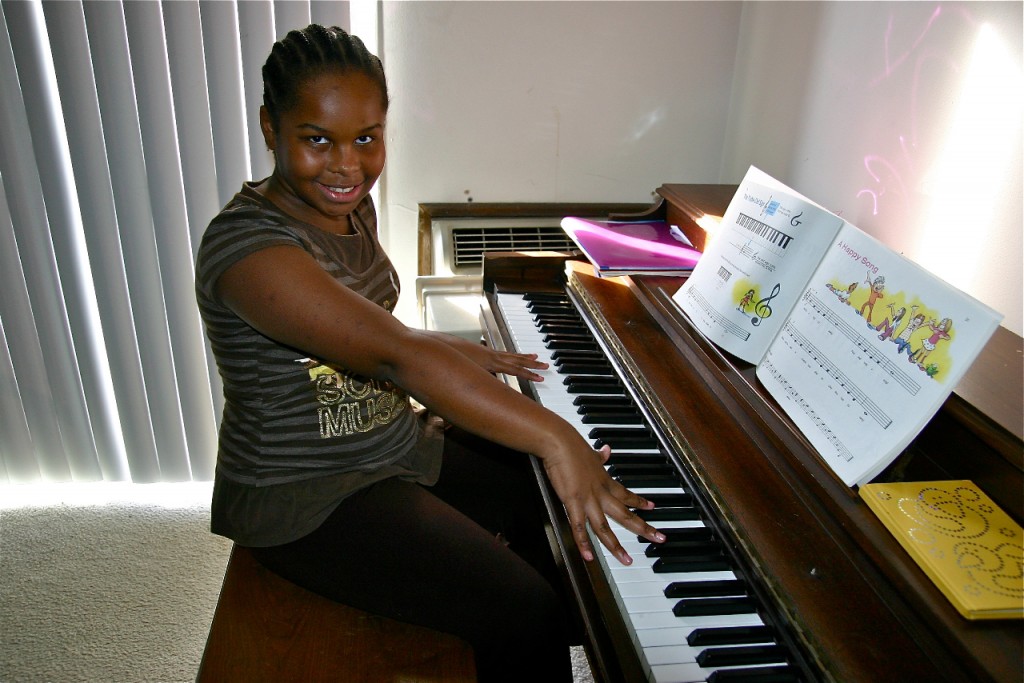15 Feb Piano Pioneers – The Joy Trip Project
Gabrielle Seals is an aspiring piano student with big ambitions. “I want to go to Juilliard,” she says. “But for my career… my career, career I want to go to Harvard to be a forensic anthropologist.”
This Madison sixth grader, age 11, only started taking piano lessons in September. And despite her family’s economic challenges she’s already making plans for the future. Thanks to a unique program called Piano Pioneers Gabrielle can include training in music on her application to the Ivy League.
“I’ve done some research and Harvard is a really good school,” she says. “Graduating from there I’ll be eligible to go anywhere in the world.”
Bright and precocious -she skipped the 1st grade- Gabrielle is one of many children in Dane and five adjacent counties who receive free piano lessons. They are also provided with a used instrument from the Steinway Piano Gallery of Madison so they can practice at home.
“At first she tried to learn using a keyboard and the computer online. But that didn’t work very well,” says Gabrielle’s grandmother Mary Wells. “It’s blessing to have the piano here so she can practice and we could never have afforded the lessons on our own.”
Piano Pioneers is a program of synergy. Gabrielle gets expert training each week at the UW Madison School of Music. Volunteer graduate students provide free one-on-one instruction. And at home she can practice daily on a piano provided by Steinway.
“Our goal is to enrich students’ lives through music and to share our love for music making,” says Paola Savvidou, a PhD candidate and the program coordinator of Piano Pioneers. “But it depends on what they want to do as well. Some students play for a hobby. Others take it more seriously to study in university. Our goal is to facilitate whichever they want.”
Founded in 2005 Piano Pioneers is funded by a grant from the Ira and Ineva Reilly Baldwin Wisconsin Idea Endowment. With a mission to serve low-income families the program is not necessarily for child prodigies. Nor is it a training center to create the next generation of concert pianists. Jenny Binzley has two children Mary,9, and Charlie, 8, who take piano lessons on Mondays after school. “It’s really just a way to expose our kids to music and make it part of their lives,” she says. “We want them to have a well-rounded education.”
With many school districts forced to eliminate music from their curricula in response to budget restraints, families have been left to find instruction on their own. Private lessons for many are prohibitively expensive. Add to that the cost of an instrument and piano lessons are all but impossible.
But working in cooperation with the Steinway Piano Gallery, 6629 Mineral Point, Piano Pioneers makes learning music more than affordable. “We were able to join forces and they were very generous in covering all the costs of transportation, for tuning and restoration,” says Savvidou. “The savings is thousands of dollars, which can now be used for tuition, for books and other things for the program. There’s a lot of need.”
Through the non-profit Steinway Society pianos are received as donations from families who no longer need them. Grant Billings, president of the Steinway Piano Gallery, says donors are pleased to see their instruments put to good use.
“The community has been incredibly supportive,” Billings says. “When you talk about taking mom or grandma’s old piano that’s worth a few hundred dollars and donating it to a student who would not have a piano if not for this program people would rather give the piano away than get something for it.”
The Steinway Gallery includes a free appraisal of the piano so the donor can get a tax deduction. As long as the instrument is in good repair or requires minimal restoration the donated piano is made available to a student in need. Billings says most student pianos are of the upright variety because they’re easier to move and require less space in a modest home.
A larger grand piano was recently donated. But rather than giving it to a student the instrument, a class Steinway, is being restored and could be sold for as much as $50,000. The proceeds of that sale, less the cost of restoration will be donated to Piano Pioneers.
“The donor loves the idea,” Billings said. “It will go to help 30 kids instead of just one.”
This story originally appeared in the December 2009 issue of the Capital Region Business Journal philanthropy column “Good Works”




You must be logged in to post a comment.